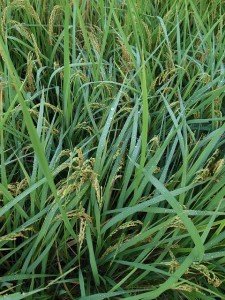Roundup Ready crops may be creating super-weeds
A recent study published in New Phytologist found that glyphosate-resistant crops that cross with closely related wild weeds could confer a fitness advantage to these weeds, even in areas where glyphosate (the active ingredient in Roundup) is not being used. Researchers crossed glyphosate-resistant rice with their weedy relatives to examine the performance of the hybrids when compared to the original weed varieties. Even when planted in areas where glyphosate was not being used, the crop-weed hybrids produced up to 125 percent more seeds than non-transgenic weeds. They also found that the hybrids had higher photosynthetic rates and germination rates than unaltered weeds. This study suggests that when glyphosate-resistant genes contaminate local weed germplasm, the weeds may be more difficult to control, affecting both conventional and organic farms alike. Additionally, the weeds may be able to out-compete native plants, resulting in environmental problems.



